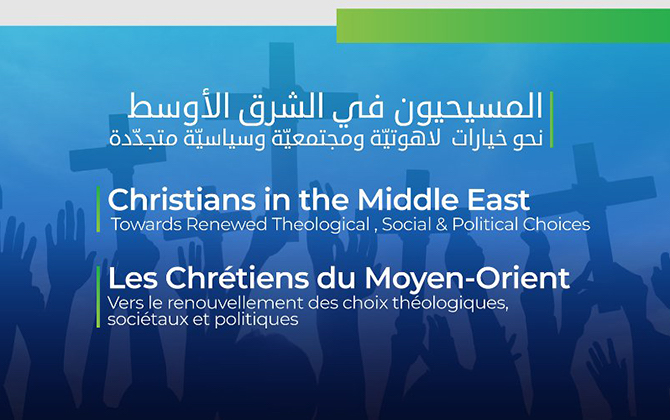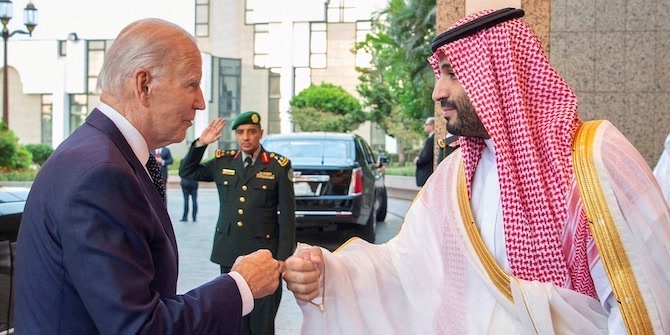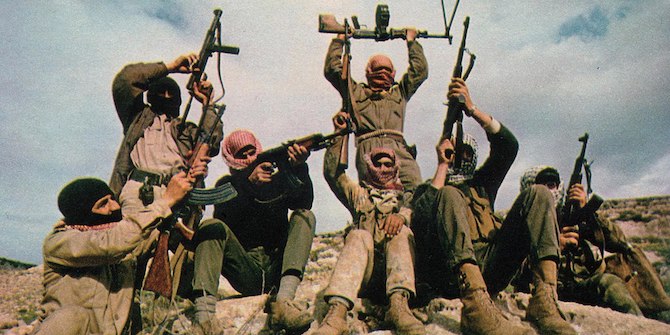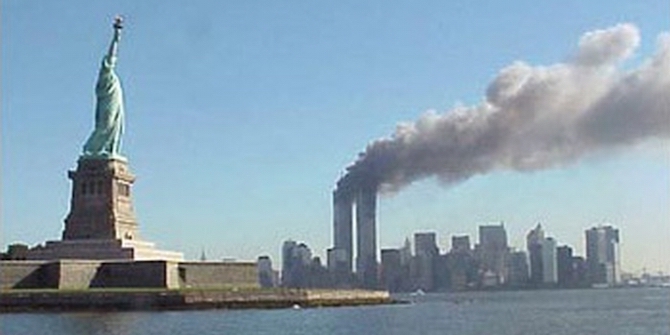by Jennifer Griggs

The group of Christian intellectuals and leaders met in Lebanon in autumn 2021 to launch their vision for Christians in the Middle East. Source: Twitter/@nakhtaralhayat
We Choose Abundant Life names both a statement of intent and the group of Christian intellectuals and leaders who met together in Beirut last autumn to launch their vision for Christians in the region. The group who convened included Assaad Elias Kattan, Professor of Orthodox Theology at the University of Münster, Gabriel Hachem, Professor of Systematic Theology at USJ Beirut, and Souraya Bechealany, Secretary General of the World Council of Churches.
We Choose Abundant Life (@nakhtaralhayat) promotes a new vision for the cultural diversity of Middle Eastern society over a narrow focus on Christians as a beleaguered minority in an Islamic world. Their aim is to reinvent Arabism from the failed modernist project of forced Arabisation to become a space for the inclusivity of diverse cultures. This reinvented Arabism includes the diverse richness of identities amongst the Churches of the Middle East including the Greek, Coptic, Syriac and Armenian traditions. They present a stark choice, to choose the abundant life that is promised to God’s people in Deuteronomy 30:19b (‘Choose life, so that you and your descendants may live’), which is both the choice and the challenge taken up by this group of Christian intellectuals or the alternative which is to resign themselves to the gradual death of Christian communities in the Arab world. The problem of sharply declining populations of Christian communities in the Middle East is particularly evident in Iraq, due to the political turbulence in the region, and Iraqi church leaders have been outspoken in their need for assistance. Pope Francis’ visit to Iraq in March 2021 was presented by Vatican News as a response to this crisis for Iraqi Christians and as a sign of support for the dwindling community of Christians in the region, both Catholic and non-Catholic such as the Assyrian Church of the East. We Choose Abundant Life also reflects the secondary aim of the Pope’s visit ‘to promote dialogue and common living between all the religious components’ from the ecumenical level to Christian-Muslim relations, including dialogue with both Sunni and Shiʿa communities.
We Choose Abundant Life focuses on how Christians should relate to people of other religions, who should be viewed as their brothers and sisters in upholding their right to dignity and freedom. This vision of living together with believers of other religions is extended especially to Muslims and, of course, it is Muslims who form the majority religious community with whom the Christians of the Middle East must live alongside successfully if their future in the region is to be assured. This unequivocal reality is not explicitly stated, though as a statement of intent We Choose Abundant Life presents the aspirations of this group in the form of an invitation towards others to join them in forming a new pluralistic identity for Arab society in the Middle East. This is the beginning of the dialogue required for the model of cultural diversity and religious parity being envisaged for Arab society in the Middle East; dialogue which must include widespread consultation with representatives of many other religious communities, including Muslim religious scholars and leaders.
There is the potential for the We Choose Abundant Life document to have the reach of the Common Word interfaith initiative; an initiative which began as an open letter written by The Royal Aal al-Bayt Institute for Islamic Thought in Jordan on 13 October 2007. The Common Word letter was composed from a defensive attitude to assert that Islam was indeed a religion of peace and, like Christianity, upheld the love of one’s neighbour and the love of God as cornerstones of religious faith. The authors of We Choose Abundant Life have a much more specific focus on the fate of religious minorities in the Arab world, rather than Christian-Muslim relations in general. While they aspire to a pluralistic model of society, such an aspiration cannot exist unilaterally, but needs to be met and accepted by those belonging to other religious beliefs and intellectual orientations within civil society. Formal responses to this document, particularly from Muslim religious leaders, would indicate whether this vision can really be shared by their religious others in the Arab world. Indeed, this is precisely what occurred with the Common Word document, when Christian leaders such as the Archbishop of Canterbury and Pope Benedict XVI gave their support to the Muslim call for interfaith dialogue. Other signatories included Muslim scholars in the West, such as Professor Seyyed Hossein Nasr, alongside Grand Muftis from throughout the Islamic world.
The We Choose Abundant Life document also outlines a mission to move towards a culture of dialogue and one that explicitly includes not only Muslims, but also Jews, as the primary partners in this inter-religious endeavour. Their intention is to distance themselves from the polemics that exist between Christianity and other religions. Thus, communities belonging to faiths other than Christianity must be approached with an openness to listening and a desire to understand the traditions of religious others in their own terms rather than judged entirely from the perspective of one’s own values and claims to truth. We Choose Abundant Life calls for a new chapter in relations with Jews who they see as integral to the religious tapestry and pluralism of the region. On the geopolitical side, the tendency to seek protection for religious minorities from dictatorial political regimes is rejected as the limited mentality of seeking a ‘minority alliance’ that does not serve the long-term future of Christians in the region. This is a new theological discourse and a new social contract that is characterised by inclusivity and openness towards others.
We Choose Abundant Life envisions a renewed contextual theology and the group emphasises above all a methodological approach that depends on perspectives provided by the modern humanistic sciences. This contextual theological approach has recently formed a week-long series of seminars at the Université Saint-Joseph de Beyrouth in which the stated objectives were to analyse the social and political situation for Christians in the Middle East, identify specific challenges and propose strategic choices for the Eastern churches and their communities. This contextual theology seeks to examine the geopolitical situation in relation to religious discourse and praxis, depending on the methodological approaches of history, cultural anthropology and the social sciences for its hermeneutics. This emphasis on the human and social sciences allows for a historical-critical methodology that understands the divine word in the cultural context of its revelation and thus interpretation of the Bible includes comparison with other texts of the Ancient East, so that modern hermeneutical tools can inform the theological application of the biblical canon.
This new theological discourse has a strong ethical and social emphasis, upholding personal freedom and the freedom of conscience as a foundation for the flourishing of innovation and creativity that underpins the cultural model of diversity. Another challenge posed by the vision of We Choose Abundant Life is to suggest that not only Christians, but all members of society should come to appreciate their role as citizens contributing to the common good. While there have been signs of such feelings in the Arab Spring when popular protests arose around the perception of shared injustices, it is still questionable how far the obverse, the common good, is something that can be conceived and worked towards as a standard of peaceful civic life. The good of one’s own community, religious, tribal or ethnic, forms a more recognisable goal within Arab societies, while the civic obligation of the independent citizen is more familiar to the West. Perhaps it is only through a careful negotiation of these values on the geopolitical plane that a pluralistic civic society can be re-envisioned for the Arab world, and through a recognition that civic responsibility and individual autonomy are rather more ambiguous concepts outside of the European legacy of post-Enlightenment liberalism.
This article has been adapted from Jennifer’s review of the We Choose Abundant Life document which was published online by the Orthodox Christian Studies Centre of Fordham University.






